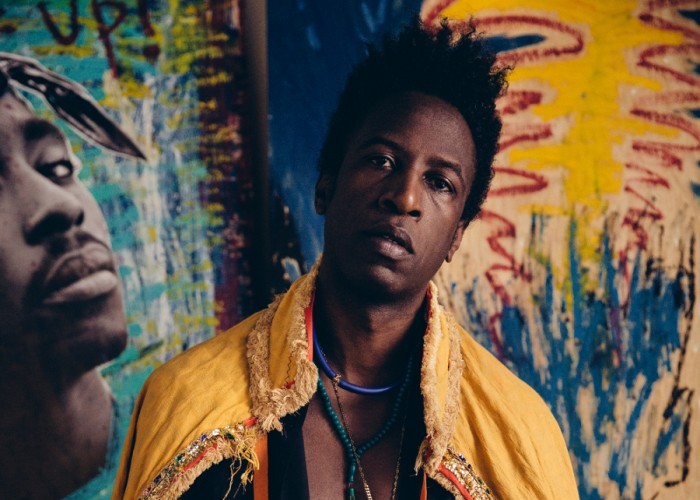Jan 13, 2026 2:09 PM
More Trump-Kennedy Center Cancellations
The fallout from the renaming of the John F. Kennedy Center for the Performing Arts to include President Donald…

Spoken word artist Saul Williams contributed to David Murray’s Blues For Memo (Motéma).
(Photo: Geordie Wood)You mentioned in the past that you initially had trepidations about jazz.
I dodged jazz publicly, because I didn’t want to be pigeonholed. There’s something about poetry that makes it easier for you to get associated with either some snappin’-your-fingers r&b, Common/Jill Scott shit or some jazz shit.
So, I stood alongside a lot of the electronic shit and rock shit just to juxtapose the idea of what spoken word was associated with at the time. Plus, I always felt that what I was doing was punk in a public sense. But despite that I found myself collaborating with a cellist or a saxophonist, albeit on a different level.
Now that I’m working with David Murray, I feel like this is just the tip of the iceberg. It’s been coming, and I basically stopped refusing it. I’m on the road with these guys now, but before this I did some shows with Preservation Hall. And then my new neighbor is Christian Scott, who has been coming over, and we’ve been exchanging music and ideas. I had been vibing with him—be it on the phone or online—for like 10 years now. But we never got to sit down and make music together until about a month ago. There’s so much going on with me in this world right now, I imagine this is just the beginning.
Has the way you listen to jazz changed?
I spend a lot of time going back and discovering the forefathers of this creative jazz shit, just because I felt like I needed to have a working knowledge of what all these older cats are trying to instill in me and what they were referencing. It’s really interesting to hear all of these distinctions.
I was talking to Christian Scott [recently], and he was telling me when he was a kid, he wasn’t allowed to listen to anyone who was alive. That was the rule in his house, because you don’t want to have a style that’s compared to anybody contemporary.
Lyricist Lounge, Vol. 1 was released 20 years ago. Was the journey from poetry to hip-hop similar to your journey into jazz?
The Lyricist Lounge thing was literally just a natural progression from what I was doing at the Nuyorican Café, and then getting in with Stretch and Bobbito, who had made a night of hip-hop and poetry there. And I was always on the poetry side. But because of that, a lot of MCs recognized what I was doing and saw there was a relationship to rapping. So, they were OK with complimenting me, because I wasn’t an MC and I wasn’t trying to battle them. As a result, they started being really generous and inviting me out to participate in these jam sessions called “ciphers.”
It also had a lot to do with the fact that commercial hip-hop was pushing away from lyricism during that time period with the gangsta explosion and Puff Daddy and all that. So, cats in New York were really into the boom bap and exploring it even further. And when I think of it now, there was definitely a spirit of jazz in that period of hip-hop, with those freestyle ciphers. It was similar, to me, to what was going on in the ’60s and ’70s during the whole loft-jazz era. And I think, even if it was subconsciously, we felt that and we dug it. There was definitely a feeling of jazz at the Lyricist Lounge. DB

Belá Fleck during an interview with Fredrika Whitfield on CNN.
Jan 13, 2026 2:09 PM
The fallout from the renaming of the John F. Kennedy Center for the Performing Arts to include President Donald…

Peplowski first came to prominence in legacy swing bands, including the final iteration of the Benny Goodman Orchestra, before beginning a solo career in the late 1980s.
Feb 3, 2026 12:10 AM
Ken Peplowski, a clarinetist and tenor saxophonist who straddled the worlds of traditional and modern jazz, died Feb. 2…

The success of Oregon’s first album, 1971’s Music Of Another Present Era, allowed Towner to establish a solo career.
Jan 19, 2026 5:02 PM
Ralph Towner, a guitarist and composer who blended multiple genres, including jazz — and throughout them all remained…

Rico’s Anti-Microbial Instrument Swab
Jan 19, 2026 2:48 PM
With this year’s NAMM Show right around the corner, we can look forward to plenty of new and innovative instruments…

Richie Beirach was particularly renowned for his approach to chromatic harmony, which he used to improvise reharmonizations of originals and standards.
Jan 27, 2026 11:19 AM
Richie Beirach, a pianist and composer who channeled a knowledge of modern classical music into his jazz practice,…